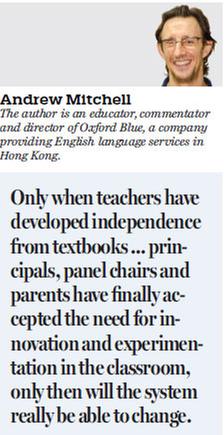Schools should reduce dependence on pricey textbooks

The high cost of textbooks is a perennial bugbear for Hong Kong parents - this year more than ever, as the rise in textbook prices outstripped inflation by 1.4 percentage points. According to a survey conducted by the Consumer Council in July, prices of more than 95 percent of commonly used primary- and secondary-school textbooks increased an average 3.2 percent this year, compared with a year-on-year inflation rate of 1.8 percent. The difference is the highest since 2008.
The news comes as no great surprise. A perfect storm of high population density and high course-book saturation means the Hong Kong textbook market is an extremely important one for local and international publishers alike. As student enrollments are largely in decline, publishers are keen to keep their revenue losses to a minimum. With the government and schools reluctant to interfere in the workings of the free market, it is inevitably parents who end up footing the bill.

So what can be done to alleviate the burden of textbook costs on Hong Kong parents? One solution, which I mentioned in a previous article, would be to widen the scope of the School Textbook Assistance Scheme, a program which provides grants for textbooks to students from low-income families. Another would be to provide schools with a fixed budget for educational materials, making them financially accountable for their textbook choices. Both these solutions, however, would entail an increase in government expenditure, but neither would deal with the underlying issue: overreliance on textbooks in many local schools.
In announcing the findings of the Consumer Council's survey, Professor Michael Hui King-man, chairman of the council's publicity and community relations committee, encouraged schools and teachers to reduce their reliance on textbooks in order to lessen the financial burden on parents. While acknowledging textbooks are "an important type of material" for teaching and learning, Hui stressed that "in modern teaching there are lots of other tools and materials you can make use of".
Many of these tools and materials can be found at the Education Bureau's One-stop Portal for Learning and Teaching Resources, an online depository of free materials for teachers, students and parents. Housed at the HKEdCity website (http://www.hkedcity.net/edb/teachingresources/), the portal offers a variety of resources for not only learning and teaching but also professional development.
For teachers to make effective use of these or any other resources, however, they need to be given more space in the school curriculum, and more freedom to explore that space. In other words their schools need to not only reduce the number of books they adopt (it is currently not uncommon for a school to use multiple books for the same subject - for example a workbook, grammar book or listening book (or sometimes all three) to supplement an English Language textbook); they also need to loosen the prescriptions requiring teachers to blindly follow book content.
For these changes to take place, the EDB needs to intensify its continuing professional development programs for principals and panel chairs so they understand the importance of ceding control over what happens in the classroom. It also needs to engage with parents on the issue, as the preconception among many parents that textbooks should be used in full is one of the key forces driving teachers to adhere unquestioningly to the prescribed school curriculum.
The main focus for training, however, needs to be the teachers themselves. Non-graduate teachers in particular need to be empowered to break away from the constraints of textbooks so they can progress from being passive deliverers of content to active creators of learning materials. Whether these materials are adapted from textbooks or online resources, created from realia (everyday objects used in classroom) or produced from scratch, it makes no difference; the important thing is that the textbook is no longer a dictator of content in the classroom but rather a resource to be supplemented and modified like any other, in line with the specific needs of the class.
Only when teachers have developed this independence from textbooks, and only when principals, panel chairs and parents have finally accepted the need for innovation and experimentation in the classroom, only then will the system really be able to change. For only then will teachers have the expertise and the freedom they need to make effective use of materials such as the ones offered at the EDB portal.
Until that time many schools will continue to function as passive consumers of content, and parents will foot the bill.
(HK Edition 09/14/2017 page7)
Today's Top News
- China, Japan, ROK urgently need an FTA
- From humanoids to parallel intelligence
- Shared wartime history unites nations, envoy says
- Mutual trust reaffirmed in visit
- 12 dead, 4 missing after bridge collapses in Qinghai
- Steps taken to boost domestic consumption






























